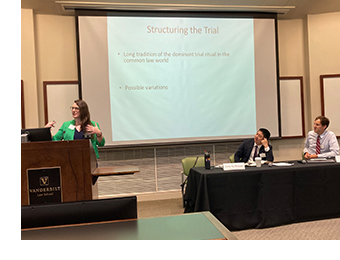PROFESSOR EMILY SPOTTSWOOD PRESENTS WORK-IN-PROGRESS AT VANDERBILT LAW SCHOOL
 May 2024 — Professor Emily Spottswood attended the Evidence Summer Workshop at Vanderbilt Law School to present a chapter from her forthcoming book, Malleable Memories and the Law of Proof.
May 2024 — Professor Emily Spottswood attended the Evidence Summer Workshop at Vanderbilt Law School to present a chapter from her forthcoming book, Malleable Memories and the Law of Proof.
Emily Spottswood is a Visiting Professor at Penn State Dickinson Law, and her work focuses on issues relating to the fairness of the trial process. Her forthcoming book analyzes how the design of litigation systems should evolve in light of modern psychological research regarding the nature and frailties of human memory. As she illustrates, our trial process has become distorted, giving too much emphasis on catching deliberate deception by witnesses, while giving short shrift to problems arising from degradation of witness memories and the unconscious fabrication of details in the suggestive environment of the pretrial process. Judges have tended to treat memories as durable and recoverable through effort, whereas in reality they are malleable, easily altered through subtle suggestions and constantly degrading over time. The book includes a section making these claims descriptively, and then provides a number of recommendations for improvements to the pre-trial and trial phases of civil and criminal trials, which are designed to ensure that juries hear fewer accounts based on distorted and diminished memories, which should ultimately help us reduce the rate of erroneous outcomes in civil and criminal litigation. The chapter she presented at the conference focused specifically on issues arising during the interrogation of criminal suspects, and the book is scheduled to be published by the New York University Press in 2025.
Professor Emily Spottswood focuses her research on the process of fact-finding in courts, including issues in evidence law, jury decision-making, the structure of trials, and pre-trial procedure. One strand of her recent work focuses on probabilistic reasoning and the optimal structure of burdens of proof, arguing that varying sanctions continuously in response to varying levels of confidence in guilt has a number of important advantages relative to the all-or-nothing approach that presently predominates in our trial process. In other work, she has drawn attention to a number of structural biases in the design of jury trials, including problems that may stem from default approaches to the ordering of evidence as well as the suboptimality of standard jury instructions concerning conjunctive and disjunctive reasoning.